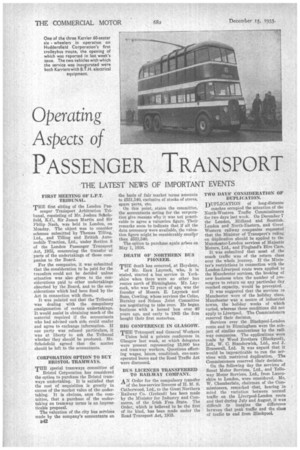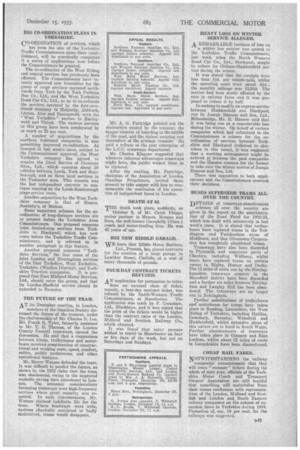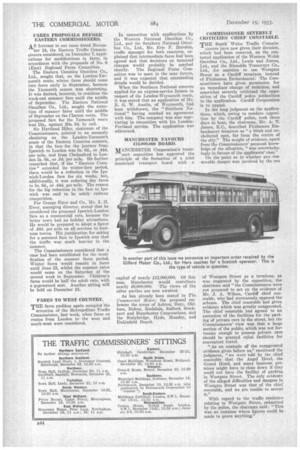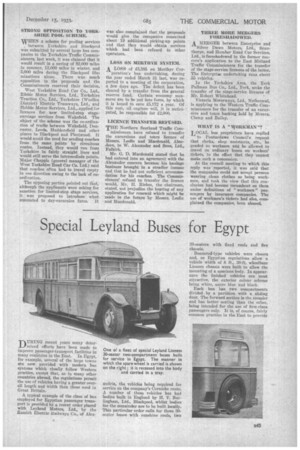Operating Aspects of
Page 60

Page 61

Page 62

Page 63

If you've noticed an error in this article please click here to report it so we can fix it.
PASSENGER TRANSPORT
THE LATEST NEWS OF IMPORTANT EVENTS
FIRST MEETING OF L.P.T. TRIBUNAL
THE first sitting of the London Pas
senger Transport Arbitration Tribunal, consisting of Mr. Joshua Selolefield, K.C., Sir James Martin and Sir Philip Nash, was held in London, on Monday. The object was to consider schemes submitted by Thomas Tilling, Ltd., and Tilling and British Automobile Traction, Ltd., under Section 8 of the London Passenger Transport Act, 1933, concerning the transfer of parts of the undertakings of those companies to the Board.
For the companies, it was submitted that the consideration to be paid for the transfers could not be decided unless attention was also given to the considerations paid to other undertakings absorbed by the Board, and to the considerations which had been fixed by the Act in connection with them.
It was pointed out that the Tribunal was dealing with the compulsory amalgamation of certain undertakings. It would assist in obtaining much of the material required if the accountants who had advised each side could confer and agree to exchange information. If one party was refused particulars, it was at liberty to ask the Tribunal whether they should be produced. MT. Scholefield agreed that the matter should be left to the accountants.
CORPORATION OPTION TO BUY BRISTOL TRAMWAYS.
THE special tramways committee of
Bristol Corporation has considered the option to purchase the Bristol tramways undertaking. It is satisfied that the cost of acquisition is greatly in excess of the market value of the undertaking. It is obvious, says the committee, that a purchase of the undertaking on tramway terms is an impracticable proposal.
The valuation of the city bus services made by the company's accountants on
the basis of fair market terms amounts to £531,540, exclusive of stocks of stores, spare parts, etc.
On this point, states the committee, the accountants acting for the corporation give reasons Why it was not practicable to agree a valuation figure. Their remarks seem to indicate that if all the data necessary were available, the valuation figure might be considerably srnallpr than £531,540.
The °Oben to purchase again arises on May 1, 1936.
DEATH OF NORTHERN BUS PIONEER.
1 death has occurred, at Heysham,
of Mr. Ezra Laycock, who, it is stated, started a bus service in Yorkshire when there were no other bus routes north of Birmingham. Mr. Laycock, who was 72 years of age, was the founder of Messrs. E. Laycock and Sons, Cowling, whose services the Colne, Burnley and Nelson Joint Committee are negotiating to take over. He began business with a horsed bus over 40 years ago, and early in 1905 the firm bought their first motorbus.
BIG CONFERENCE IN GLASGOW.
THE Transport and General Workers
Union held a private conference in Glasgow last week, at which delegates were present representing 15,000 bus and tramway workers. Questions affecting wages, hours, condition's, one-manoperated buses and the Road Traffic Act were discussed.
BUS LICENCES TRANSFERRED TO RAILWAY COMPANY.
AN Order for the compulsory transfer of the bus-service licences of H. M. S. Catherwood, Ltd., to the Great Northern Railway Co. (Ireland) has been made by the Minister for Industry and Commerce, of the Irish Free State. The Order, which is believed to be the first of its kind, has been made under the Road Transport Act, 1933.
TWO DAYS' CONSIDERATION OF DUPLICATION.
DUPLICATION of long-distance coaches occupied the attention of the North-Westren Traffic Commissioners for two days last week. On December 7 the London, Midland and Scottish. London and North-Eastern, and Great Western railway companies requested that the Minister of Transport's ruling on duplication should be applied to the Manchester-London services of Majestic Motors, Ltd., and Fingland's Hire Cars.
It was submitted that most of the coach traffic was of the return class over the whole journey. If the Minister's restrictions in connection with the London-Liverpool route were applied to the Manchester services, the booking of new business when the number of passengers to return on any particular day reached capacity, would be prevented.
It was suggested that the services to Manchester were of the holiday class. Manchester was a centre of industrial towns, the holiday weeks of which varied, whereas these conditions did not apply to Liverpool. The Commissioners reserved their decision.
.Services over the Blackpool-London route and to Birmingham were the subject of similar contentions by the railway companies. The applications were made by Wood Brothers (Blackpool), Ltd., W. C. Standerwick, Ltd., and J. Bracewell, Ltd. It was argued that it would be impracticable to run the services with restricted duplication. The Commissioners reserved their decision.
On the following day the services of Scout Motor Services, Ltd., and Yelloway Motor Services, Ltd., from Lancashire to London, were considered. Mr. W. Chamberlain, chairman of the Commissioners, remarked that, bearing in mind the variation between normal traffic on the Liverpool-London route and that during July and August, it was difficult to imagine the difference between that peak traffic and the class of traffic to and from Blackpool.
BIG CO-ORDINATION PLANS IN ORKS HIRE.
CO-ORDINATION of services, which has been the aim of the Yorkshire Traffic Commissioners since their establishment, will be practically completed if a series of applications now before the Commissioners be granted.
The co-ordination of the West Riding and coastal services has previously been effected. The Commissioners have re cently aopreved new timetables for the group of stage services operated north wards from York by the York Pullman Bus Co., Ltd., and the West Yorkshire Road Car Co., Ltd., so as to co-ordinate the services operated by the first-mentioned company to Helperby, Alc
Linton, Alne and -Easingwold, with the 'West Yorkshire" service to Easieg
wold and Thirsk. The various services in this group have been accelerated by as much as 25 per cent.
A number of acquisitions by the northern federated companies is also permitting improved co-ordination. As forecast in last week's issue, subject to the Commissioners' approval, the West Yorkshire company has agreed to acquire the Ideal Service of Corcoran Bros., Ltd., which operates about 20 vehicles between Leeds, York and Scar borough, and on three local services in the Tadcaster area. This concern was the last independent operator to continue running on the Leeds-Scarborough stage-service route.
Another acquisition by the West Yorkshire company is that of Messrs. Suddahy's, of Melton.
Some important schemes for the coordination of long-distance services are at present before the Yorkshire Area Commissioners. One proposal concerns joint limited-stop services from York shire to Blackpool, which has now come before the Yorkshire Traffic Commissioners, and is referred to in another paragraph in this feature.
Another proposal concerns "Yorkshire Services," the line name of the joint London and Birmingham services of the East Yorkshire, West Yorkshire, Yorkshire (Woollen District), and York shire Traction companies. It is pro posed that East Midland Motor Services, Ltd., should enter the group, and that its London-Sheffield service should be extended to Barnsley.
THE FUTURE OF THE TRAM.
AT its December meeting, in London,
members of the Omnibus Society discussed the future of the tramcar, under the chairmanship of Mr. Charles E. Lee. Mr. Frank R. Tyler, formerly assistant to Mr. T. E. Thomas, of the London County Council tramways, opened the discussion. He said that a comparison between trams, trolleybuses and motorbuses involved consideration of constructional and working costs, speed, comfort, safety, public preferences, and the operational features.
Mr. Henry Watson defended the tram. it was difficult to predict the future, as shown by the 1872 claim that the train was obsolescent, owing to the improved asphalte paving then introduced in London. The economic considerations favouring tramways were high-frequency services where great capacity was required. In such circumstances, Mr. Watson claimed iudefinite life for the tram. Where head ways were wide, systems Physically restricted or badly maintained, trams would disappear.
Mr. A. G. Partridge pointed out the obstruction caused by the tramcar, the danger element of boarding in the middle of the road, and the. violent swaying mid discomfort of the average tramcar. He paid a tribute to the past enterprise of the L.C.C. tramways department.
Mr. Charles Klepper suggested that whatever inherent advantages tramways might have, the public wished them to be replaced.
After the meeting, Mr. Partridge, chairman of the Association of London Omnibus Proprietors, invited those present to take supper with him to commemorate the conclusion of his operation of independent buses in London.
DEATH AT 42.
THE death took place, suddenly, on
October 0, of Mr. Caleb Phipps, senior partner in Messrs. Morgan and Rees, the well-known Caerphilly (Glam.) coach and motor-trading firm. He was 42 years of age.
BIG NEW RIBBLE GARAGE.
WE learn that Ribble Motor Services,
Ltd.,_Preston, has placed contracts for the erection of a large garage in Lowther Street, Carlisle, at a cost of many thousands of pounds.
FOUR-DAY CONTRACT TICKETS REFUSED.
AN application for permission to introduce an unusual class of ticket, namely, a four-day contract ticket, was refused by the North-Western Traffic
Commissioners, at Manchester. '['he application was made by F. Cronshaw, Ltd., Blackburn, and it was stated that the price of the tickets would be higher than the contract rates of the London, Midland and Scottish Railway Co., which objected.
It w'as found that ninny persons wished to travel to Manchester on four or five days of the week, but not on Saturdays and Sundays. HEAVY LOSS ON WINTEU SERVICE ALLEGED.
A REMARKABLE instance of loss on
a winter bus service was quoted to the Yorkshire Traffic Commissioners, het week, when the North Western Road Car Co., Ltd., Stockport, sought to reduce its OldhamsHudderefield service during the winter.
It was stated that the receipts were less than lid. per vehicle-mile, whilst the operating costs were about Sid.; the monthly mileage was 13,910. The service had been sorely affected by the cuts in railway fares and it was pro
posed to reduce it by half. _
In seeking to modify an express service between Huddersfield and Blackpool, run by Joseph Hanson and Son, Ltd., Milnesbridge, Mr. R. Hanson said that it was being run at a considerable lose during the winter. On behalf of various companies which had submitted to the Commissioners a scheme for the coordination of services between Yorkshire and Blackpool (referred to elsewhere in this issue), it was suggested that a working arrangement might be arrived at between the pool companies and the Hanson concern for the former to take over the winter service of Joseph Hanson and Son, Ltd.
There was opposition to both applications and the Commissioners reserved their decisions.
BUSES SUPERSEDE TRAMS ALL OVER THE COUNTRY.
DETAILS of tramways-abandonment
schemes all over the country are given in the report on the administration of the Road Fend for 1932-83, which was dealt with extensively in last week's issue. It is stated that trolleybuses have replaced trams in the Teddington and Twickenham areas of Middlesex, and that Gloucester Corporation has completely abandoned trams.
Tramways_ have also been discarded in Plymouth, and numerous parts of Cheshire, including Wallasey, whilst buses have replaced trains on certain routes in Ripley, Eleanor and Derby. The 12 miles of route run by the Nottinghamshire tramways concern in the Mansfield district have been discarded and a further six miles between Nottingham and Langley Mill has been abandoned. The tramways are no longer run in Nottingham.
Farther substitutions of trolleybnses and' motorbuses for trams have taken place in Reading, Lancashire, the West Riding of Yorkshire, including Halifax, Dewsbury, Barnsley, Wakefield and Huddersfield, whilst extensive plans of this nature are in hand in South Wales. Further abandonments of tramways have taken place in Glasgow and East Lothian, whilst about 27 miles of route in Lanarkshire have been discontinued.
CHEAP RAIL FARES.
NOTWITHSTANDING the railway
companies' announcement that they will issue " summer " tickets during the whole of next year, officials of the Yorkshire Motor Coach and Transport Owners' Association are still hopeful that something will materialize from their recent conference with representatives of the London, Midland and Scottish and London and North Eastern railway companies on the subject of excursion fares in Yorkshire during 1034. Protection of, say, 10 per cent, for the railways was suggested.
FARES PROPOSALS BEFORE EASTERN COMMISSIONERS.
AS forecast in our issue dated Novem ber 24, the Eastern Traffic Commissioners considered, on December 7, applications for modifications in fares, in accordance with the proposals of No. 6 (East) Regional Fares Committee.
The Eastern Counties Omnibus Co., Ltd., sought that, on the London-Yarmouth route, winter fares should come into force early in September, because the Yarmouth season was shortening. It was desired, however, to continue the week-end summer fare until the middle of September. The Eastern National Omnibus Co., Ltd., sought the retention of summer fares until the middle of September on the Clacton route. The proposed fare for the Yarmouth route was 18s., against 20s. 9d. by rail.
Sir Haviland Riley, chairman of the Commissioners, pointed to an anomaly obtaining on the London-Yarmouth route of the Eastern Counties concern, in that the fare for the journey from Ipswich to London was 5s. 6d., or .44d. per mile, and from Chelmsford to London 5s. 6d., or .8d. per mile. He further remarked that, if the "Eastern Counties" extended its winter-fare period, there would be a reduction in the Ipswich-London fare for six weeks, but, additionally, it was reducing day fares to 6s. 6d., or .44d. per mile. The reason for the big reduction in the fare to Ipswich was said to be solely railway competition.
For George Ewer and Co., Mr. 3. H. Ewer, managing director, stated that he considered the proposed Ipswich-London fare as a commercial rate, because the latter town had no holiday attractions. He would be prepared to adopt a figure of .44d. per mile on all services to business towns. His justification for asking for a seasonal fare to Ipswich was that the traffic was much heavier in the
summer.
The Commissioners considered that a case had been established for the modification of the summer fares period. Winter fares would remain in force until june 23, whilst the summer rates would cease on the Saturday of the second week in September. Children's fares would be half the adult rate, with a guaranteed seat. Another sitting will be held on December 21.
FARES TO WEST COUNTRY..
THE fares problem again occupied the attention of the Metropolitan Traffic Commissioner, last week, when fares on mutes from London to the west and south-west were considered. In connection with applications by the Western National Omnibus Co., Ltd., and the Southern National Omnibus Co., Ltd., Mr. Eric F. Horobin, traffic manager for both concerns, explained that intermediate fares had been agreed and that decisions on terminal' charges would probably be reached shortly. The Regional Fares Committee was to meet in the near future, and it was expeeted that outstanding details would be decided.
When the Southern National concern applied for an express-service licence in respect of the London-Weymouth route, it was stated that an application of Mr. R. G. W. Austin, of Weymouth, had been withdrawn, the "Southern National" having reached an agreement with him. The company was also negotiating in connection with his LondonPortland service. The application was adjourned.
MANCHESTER FAVOURS £12,000,000 BOARD.
MANCHESTER Corporation's transport committee has approved the principle of the formation of a joint municipal transport board with a capital of nearly £12,000,000. Of this sum, Manchester would contribute nearly £6,000,000. The views of the other parties are now awaited.
As has already been stated in The Commercial Ill Nor, the proposal embraces the areas of Ashton, Bury, Oldham, Bolton, Rochdale, Salford, Stockport and Manchester Corporations, and the Stalybridge, Hyde, Mossley, and Dukinfield Board. COMMISSIONER SEVERELY CRITICIZES CHIEF CONSTABLE THE South Wales Traffic Commis sionem have now given their decision, which had been reserved, on the contested application of the Western Welsh Omnibus Co., Ltd., Lewis and James, Ltd., and the Rhondda Tramways Co.. Ltd., for sanction to use Westgate Street as a Cardiff terminus, instead of Fitzharnon Embankment. The COMmissiciners have given permission for an immediate change of terminus, and somewhat severely criticized the .opposition of the Cardiff police authorities to the application. Cardiff Corporation is to appeal.
In the long judgment on the applications, which, owing to resolute opposition by the Cardiff police, took three days to hear, the chairman, Mr. A. T. James, K.C., described Fitzhamon Embankment terminus as "a bleak and unsheltered spot, far from the centre of the city." The weight of evidence, apart from the Commissioners' personal knowledge of the situation, "was overwhelmingly in favour of .the applicants' ease."
On the point as to whether any reasonable danger was involved by the use
of Westgate Street as a terminus, as was suggested by the opposition, the chairman said "the Commissioners were not prepared to act on the evidence of Mr. J. A. Wilson, Cardiff chief constable, who had strenuously opposed the scheme. The chief constable had given evidence which was greatly exaggerated. The chief constable had agreed to an extension of the facilities for the parking of private cars in the street, but the Commissioners' view was that a large section of the public, which was not fortunate enough to possess private cars should be granted eqiial facilities for convenient travel.
" As an example of the exaggerated evidence given before us," continued the judgment, "we were told by the chief constable that the Angel Hotel, the Grand Hotel, and many business premises might have to close down if they could not have the facility of parking in Westgate Street. The only evidence of the alleged difficulties and dangers in Westgate Street was that of the chief constable, and we are unable to accept With regard to the traffic statistics relating to Westgate Street, submitted by the police, the chairman said "This was an instance where figures could be. made to prove anything." STRONG OPPOSITION TO YORKSHIRE POOL SCHEME.
WHEN a scheme for pooling services , betweeit Yorkshire and Blackpool was submitted by several large bus companies to the Yorkshire Traffic Commissioners, last week, it was claimed that it would result in a saving of 82,000 miles in summer, 13,000 miles in winter, and 5,000 miles during the Blackpool illus minations alone. There was much opposition to the proposals and the Commissioners reserved their decision,.
West Yorkshire Road Car Co., Ltd., Ribble Motor Services, Ltd., Yorkshire Traction Co., Ltd., Yorkshire (Woollen District) Electric Tramways, Ltd., and liable Motor Services, Ltd., applied for licences for new limited-stop stagecarriage services from Wakefield. The object of the scheme was the co-ordination of traffic between Wakefield, Doncaster, Leeds, Huddersfield and other places to Blackpool and Fleetwood. It would avoid the need for sending coaches from the same points by circuitous routes. Instead, they would run. from Yorkshire in fairly straight lines and would still serve the intermediate points. Major Chapple (general manager of the West Yorkshire Road Car Co. Ltd.) said that coaches often had to travel empty in one direction owing to the lack of coordination.
The opposing parties pointed out that, although the applicants were asking for sanction for limited-stop stage services, it was proposed to introduce what amounted to day-excursion fares. It
was also complained that the proposals would give the companies concerned about 19 additional picking-up points and that they would obtain services which had been refused to other operators.
LOSS. ON MERTHYR SYSTEM.
A LOSS of 13,385 on Merthyr Cor
poration's bus undertaking, during the year ended March 31 last, was reported to a meeting of the corporation, a few days ago. The deficit has been cleared by a transfer from the general reserve fund. Certain economy measures are to be put into force, by which it is hoped to save £5,172 a year. Of this sum, oil engines will, it is anticipated, be responsible for £2,000.
LICENCE TRANSFER REFUSED.
THE Northern Scotland Traffic Corn
inissioners have refused to transfer the .excursions and tours licence of Messrs. Leslie and Macdonald, Aberdeen, to W. Alexander and Sons, Ltd., Falkirk.
Mr. G. D. Macdonald stated that he had entered into an agreement with the Alexander concern because his haulage business brought in a steadier income and that he had not sufficient accommodation for his coaches. The Commissioners' refusal to transfer the licence would, Mr. H. Riches, the chairman, stated, not prejudice the bearing of any application for renewal which might be made in the flame by Messrs. Leslie and Macdonald.
THREE MORE MERGERS FORESHADOWED.
A MERGER between Enterprise and
Silver Dawn Motors, Ltd., Scunthorpe, and Humber Road Car Services, Ltd., is foreshadowed in the former concern's application to the East Midland Traffic Commissioners for the transfer of the stage-service licences of the latter. The Enterprise undertaking runs about 55 vehicles.
Iu the Yorkshire Area, the York Pullman Bits Co., Ltd., York, seeks the transfer of the stage-service licences of Mr. Robert Whitehead.
Victoria Motorways, Ltd., Netherseal, is applying to the Western Traffic Commissioners for the transfer of an excursion and tours backing held by Messrs. Clamp and Bailey.
WHAT IS A "WORKMAN"?
LOCAL bus proprietors have replied
to Pontardawe Council's request that clerks, shop assistants, etc., be graded as workmen and be allowed to travel on ordinary buses on workers' tickets, to the effect that they cannot make such a concession.
At the council meeting to which this reply was reported, it was said that the companies could not accept persons wearing clean clothes as being workmen, and took the view that this conclusion had become incumbent on them under definitions of " workmen " passengers by insurance companies. The use of workmen's tickets had also, complained the companies, been abased.




































































































